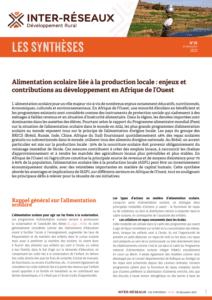Part 1: Contextual background of agricultural markets in sub-Saharan Africa
Many farmers and breeders in sub-Saharan Africa face significant difficulty when trying to bring their products to market. They also complain about the low level of profit that they are able to earn from their products. One constantly hears complaints that “prices are too low,” “erratic price fluctuations,” as well as reports that denounce “unstructured markets” and “disorganised supply chains”. In order to confront these difficulties, farmers, breeders and their institutions are developing collective and individual strategies.
These initiatives remain too few in number and are not well-known. Neither shared nor reinforced, they are rarely used by or for rural development practitioners. One still encounters among farmers (and others), persistent and inaccurate caricatures of market function and of other actors in the marketing process, particularly merchants. The poor level of knowledge about local initiatives and the functioning of markets and their actors are prejudicial, in the first instance, to farmers who cannot position themselves favourably in these markets. These factors create problems for local rural development, and in a more general way for entire countries. It is in this context that in 2004 Inter-réseaux initiated a program to analyse and collectively reflect upon these matters in a Working Group devoted to “Market Access and Agricultural Product Marketing.”
Part 2: Choices that impacted the methods and results of the Working Group
The theme of market access and agricultural product marketing being extremely vast, choices were made to selectively limit the scope of the Working Group’s field of study.
The first choice was to examine only initiatives undertaken by family farms and breeders, because family-scale operations constituted the large majority of agrarian production in the countries where the Working Group operated. This restricted the field of study by only a small amount, since family-scale operations are highly diverse. This document therefore presents a partial view, but attempts to encompass the diversity of different family-scale farming operations.
A second choice was made to focus on concrete cases: initiatives where farmers, breeders and their organisations (FO) worked effectively to improve market access and the marketing of their agricultural products.
A third choice was made to follow a program of collective reflection, designed to place actors at the centre of the process. These actors thus participated in exchange visits, carried out comparative studies and worked on written materials, video films and audio media to describe these initiatives on a case-by-case basis. Specific forms of support were provided by Inter-réseaux to carry out these activities: organisation/oversight of the process, logistical support, and financial support. The case-by-case analyses of initiatives and exchange visits were followed by further comparative analyses allowing researchers to take a step back from individual initiatives that each had their own particular features. The study then involved drawing general insights from the specific context of each of these initiatives.
Part 3: Objectives and audiences for the present document
This document is intended to compile and validate (i) the process of collective reflection developed within the Working Group to study and share case studies, and (ii) the comparative studies carried out and the insights taken from the various initiatives. It is meant to both support information sharing and encourage discussion of these points.
It can be used by anyone working with methods of collective reflection and validation of local initiatives as tools for change (in particular chapters 1 and 3, which focus on methods and tools). However, it is above all intended for people involved in activities to organise actors in agricultural product marketing: farmers and FO staff and also people working in support of these actors.
The case studies are situated in sub-Saharan Africa, but their significance and their use should not be limited to actors in this region, nor to the African continent.







